By John Helmer, the longest continuously serving foreign correspondent in Russia, and the only western journalist to direct his own bureau independent of single national or commercial ties. Helmer has also been a professor of political science, and an advisor to government heads in Greece, the United States, and Asia. He is the first and only member of a US presidential administration (Jimmy Carter) to establish himself in Russia. Originally published at Dances with Bears
The President of Cyprus Nicos Anastasiades agreed last week with President Vladimir Putin on what is reported in London and Washington to be a military basing agreement with Russia for Russia’s naval and air forces in the Mediterranean. In the aftermath, Putin did all the talking to the press, making it clear, if not explicit, that in current Russian strategy, Cyprus is far more important than Greece.
Returning home to Cyprus on the weekend, Anastasiades has disclosed no papers with his signature, assuring his party supporters – among them, the anti-Russian voter bloc on the island – that so far as military terms are concerned, he has signed nothing new. The Cyprus Mail, an anti-Russian newspaper, called Anastasiades’s trip to the Kremlin a “fizzle”. A source close to the Cyprus presidency comments that the idea of a Russian base agreement in Cyprus “is agitprop. It’s all a lot of bull.”
At the presidential meeting in Moscow on February 25, the Russian and Cyprus records announced that ten agreements were signed. In the Kremlin version, the civil agreements covered “ cooperation to combat drug trafficking and terrorism… a cooperation programme in science, education and culture for 2015-2018…and memorandums of understanding on economic, science and technology cooperation.” According to the Kremlin, there were two military pacts – one on “defence cooperation”, one on “naval cooperation”.
Anastasiades downplayed the significance of both, telling media editors the next day that they have “ to do with the renewal of an existing agreement which has been updated. What is conventionally provided for… is the right of the Russian fleet to get into the port of Limassol, not only for the purposes that was doing [sic] until now, but also with regard to the fight against international terrorism, international piracy, the illegal movement of narcotic drugs, illegal trade and other similar practices.” For Cyprus, he added, “the agreement will not have any financial cost.”
In his press conference with Anastasiades, Putin referred to “the signing of many documents concerning defence cooperation. For example, this pertains to our military ships’ entry into Cyprus ports. These are primarily Russian ships participating in international efforts to fight terrorism, international piracy, etc. First, I do not think that this could be a source of concern for anyone. Second, this is our joint work, and in this respect, we can also discuss the contribution by Cyprus to these joint efforts, and I’m confident they will bring results in those highly important, pressing areas of fighting the threats we face today, including in this region of the world.”
At Putin’s residence all Anastasiades is reported to have said was: “our strategic cooperation is not directed against any other country.”
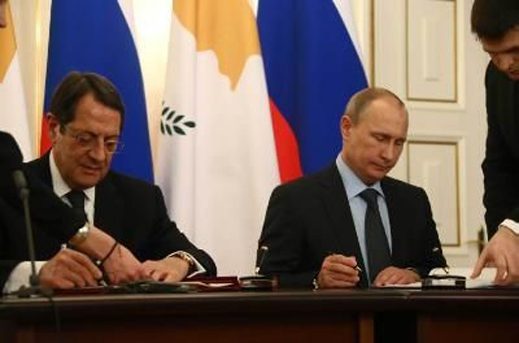
The next day, as British and US officials began complaining publicly, Anastasiades added that although he recognised the concerns of some countries over his Russia visit, Putin had not asked “for the slightest thing that would put us in a difficult position with our partners, or our partners across the Atlantic… On the contrary, we seek through the strengthening of relations, through the deepening, and even the expansion of our historic and long-standing relations, to create conditions that will allow many areas to have peace and stability.” There was a qualifier. ““We [Russia and Cyprus] will cooperate without paying attention to who is reacting or who may have concerns”.
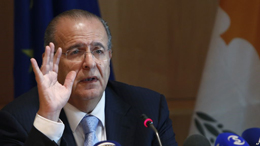 The Foreign Ministry in Nicosia has clarified the two military agreements were “a Memorandum of Understanding between the Ministries of Defense of the two countries for cooperation in the naval field”, and an “agreement was also signed between the Government of the Republic of Cyprus and the Government of the Russian Federation on military cooperation.” The signatories were the two foreign ministers, Ioannis Kasoulides (right) and Sergei Lavrov.
The Foreign Ministry in Nicosia has clarified the two military agreements were “a Memorandum of Understanding between the Ministries of Defense of the two countries for cooperation in the naval field”, and an “agreement was also signed between the Government of the Republic of Cyprus and the Government of the Russian Federation on military cooperation.” The signatories were the two foreign ministers, Ioannis Kasoulides (right) and Sergei Lavrov.
The British Foreign Office in London reacted immediately, attacking Anastasiades and claiming “in light of the current problems it is not the time to extend a hand of friendship to Russia until it shows willingness to fulfill the Minsk agreement,”.
 A Pentagon lobbyist and retired US Air Force general, Charles Wald (right), claimed to US media that the new agreement “may seem innocuous… but for Putin it is another piece of the puzzle… It is like what he does in Ukraine. He dictates his own foreign policy and he does these things in a non-splashy way. It is part of his wider scheme that seems innocuous and piecemeal, but he has a lot of patience and nobody is stopping him. “It is all part of the bigger picture of regaining the old spheres of influence …[the] deal with Cyprus, “allows Putin to regain access to a Mediterranean port and it also gives him an intelligence presence too because they can observe what the Brits are doing,” he added, referring to the RAF [Royal Air Force] base at Akrotiri.”
A Pentagon lobbyist and retired US Air Force general, Charles Wald (right), claimed to US media that the new agreement “may seem innocuous… but for Putin it is another piece of the puzzle… It is like what he does in Ukraine. He dictates his own foreign policy and he does these things in a non-splashy way. It is part of his wider scheme that seems innocuous and piecemeal, but he has a lot of patience and nobody is stopping him. “It is all part of the bigger picture of regaining the old spheres of influence …[the] deal with Cyprus, “allows Putin to regain access to a Mediterranean port and it also gives him an intelligence presence too because they can observe what the Brits are doing,” he added, referring to the RAF [Royal Air Force] base at Akrotiri.”
Cypriot nationalists issued a statement over the weekend, attacking “hypocritical hysterias” from the British and Americans. “The Republic of Cyprus as a member state of the United Nations and the European Union has every right to defend its state interests and the survival of its population with whatever means it deems fit, and no decadent colonialist has any right to interfere. Secondly, the last country which has any right to react is Britain (and in parallel the USA). For two reasons. Firstly, because for 40 years Turkey invaded and continues to occupy 37% of the Cypriot and European land, which Britain has still to condemn , even verbally. The country of Attila (Turkey) continuously attacks and threatens Cyprus, while the chatterbox Foreign Office confines itself to advocating advice of how to return to the negotiations for a solution, which [solution] bears its own fingerprints. Secondly, Britain goes out of its way to refer to a Russian invasion and occupation of Crimea. But her tongue does not turn to say the same about the Turkish invasion of Cyprus… Such righteousness, such hypocrisy, such British wretchedness, such indecency that, since 1960, has not ceased to demonstrate hostility towards the Republic of Cyprus.”
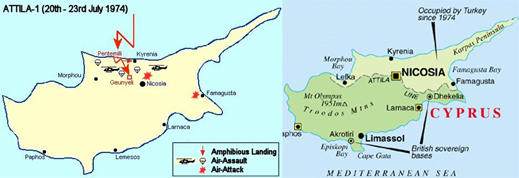
Click to enlarge: left, map of Turkish invasion of July 1974; right, current map of Cyprus, showing Turkish occupied area, and the two British occupied areas, Akrotiri and Dhekelia
If Anastasiades is telling the truth to his voters, he has agreed to nothing more than replenishment and repairs of Russian Navy vessels making routine portcalls at Limassol, as they have been doing, along with US Navy vessels, for years. For the last report of a Russian portcall in 2013, before the Ukraine war, click here.For a more recent US Navy portcall linked directly to the war in Ukraine, read this.
Anastasiades has not agreed, he is saying, to landing, refuelling or operating rights for Russian Air Force aircraft at the Andreas Papandreou airfield at Paphos, nor to an expansion of Russian intelligence facilities on the island, currently restricted to the area of the Russian diplomatic compounds.
The Paphos field (below) is the primary base for the Cyprus Air Force; it is adjacent to the civilian airport, and shares use of the runways.
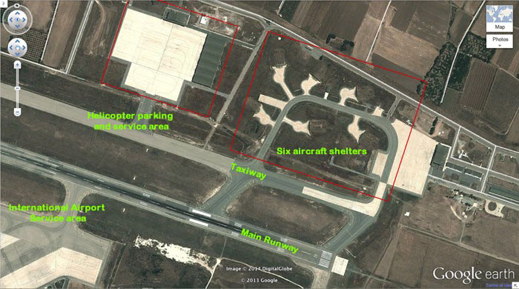
At Paphos the Cypriots operate 20 helicopter gunships, 1 or 2 maritime search aircraft, and unmanned surveillance drones. Half the helicopter fleet is Russian-made, armed, and supplied Mi-35s.
In separate incidents in 2000 and 2002, Turkish fighters approached and overflew the Paphos base, triggering radar targeting by Cypriot anti-aircraft missile batteries. A year ago, in February 2014, Cyprus conducted an exercise with the Israeli Air Force to simulate a Turkish air attack and test counter-measures.
From Paphos, along the coast road F628, it is 70 kilometres to the British airbase at Akrotiri. From the base to Limassol it is another 13 kms. The Royal Air Force (RAF) base, which was retained in 1960 as one of London’s conditions for ending the Cypriot war for independence, operates aerial surveillance (E3-D Sentry, Sentinel), aerial tankers (VC-10), and fighter-bomber attack aircraft (Typhoon, Tornado). From the beach, outside the security fence, this is the view – the E3-D Sentry to left, Typhoon fighter-bomber to right:
 Source: http://www.telegraph.co.uk/
Source: http://www.telegraph.co.uk/
In recent years, the British government reports the base has been used for aerial surveillance, refuelling, and attack sorties in the Gulf War of 1990, the Libya War of 2011, and most recently the war against ISIS in Syria. The British reportedly have told the Cypriot government the AWACS-type aircraft are operated only as intelligence gatherers, and are not used as command-and-control platforms to direct fighter-bomber attacks against foreign territory. .
According to a source at Paphos, “occasionally we see Canadians and Americans come here for their R&R when they are on missions in Syria. They arrive in their large transporters. Major airforces, unless they are hostile, use each other’s airfields to refuel, rest, park without paying the commercial parking fee. Cypriots overestimate their own usefulness to Russians, but Russians do not have to reject an offer which gives them a toehold.”
The source, who knows Anastasiades, adds: “I think the whole notion of a Russian base in Cyprus is complete bull.”
This week the UK Ministry of Defence has been telling local reporters that if Russians are based at Paphos, they will directly threaten British forces. The Cyprus Mail, a supporter of Anastasiades, claims that in Moscow he “failed, thankfully, to satisfy the demands of opposition parties and some media for a defence agreement with Russia, during his official visit. The defence agreement they envisaged would have involved offering Russia military facilities on the island, including the use of the Andreas Papandreou air-base in Paphos for the occasional stationing of its fighter planes… In fact, Sigma TV, on its Wednesday night news, after Anastasiades’ meeting with President Putin, was reporting that facilities were offered to the Russian navy and air force. Was the issue of military facilities created by the media? Perhaps it was encouraged by Russia’s ambassador who had publicly said, several weeks before the visit, that his country would be interested in discussing military facilities in Cyprus. However, despite the media’s wishful thinking, there was no such agreement. In fact the government spokesman claimed that Russia had never asked the Republic for military facilities. The defence agreement signed was an updated version of an older agreement that allowed Russian ships to dock in Cyprus ports. The updated agreement allowed Russian vessels combating terrorism and piracy to dock here, but that was all.”
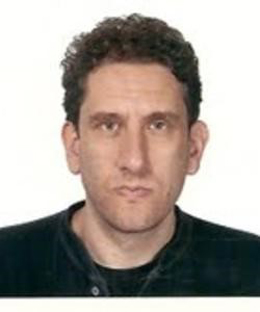 Greek, American and Israel-connected military analysts have been reporting that Anastasiades’s real strategy is to join NATO, and along with the Israelis, mount a more effective defence against Turkey. According to Andreas Stergiou at the University of Crete (right), “since Israeli-Turkish relations became strained from 2008, Greece, Israel and Cyprus have moved closer in an unprecedented political, military and energy relationship. This has been boosted by the significant gas discoveries in the eastern basin of the Mediterranean…when Benjamin Netanyahu became the first Israeli Prime Minister to visit Cyprus, the two countries signed a military agreement in February 2012 allowing the Israeli Air Force to use the airspace and territorial waters around the island to protect vital energy resources. As in the Cold War era, this geostrategic shift of power triggered a new round of antagonism among the regional players and provoked a response. Turkey and Russia agreed to cooperate on energy and nuclear power to counterbalance this US-EU backed alliance, fuelling a new form of US-Russian conflict in the region.”
Greek, American and Israel-connected military analysts have been reporting that Anastasiades’s real strategy is to join NATO, and along with the Israelis, mount a more effective defence against Turkey. According to Andreas Stergiou at the University of Crete (right), “since Israeli-Turkish relations became strained from 2008, Greece, Israel and Cyprus have moved closer in an unprecedented political, military and energy relationship. This has been boosted by the significant gas discoveries in the eastern basin of the Mediterranean…when Benjamin Netanyahu became the first Israeli Prime Minister to visit Cyprus, the two countries signed a military agreement in February 2012 allowing the Israeli Air Force to use the airspace and territorial waters around the island to protect vital energy resources. As in the Cold War era, this geostrategic shift of power triggered a new round of antagonism among the regional players and provoked a response. Turkey and Russia agreed to cooperate on energy and nuclear power to counterbalance this US-EU backed alliance, fuelling a new form of US-Russian conflict in the region.”
 Another armchair strategist, George Papadopoulos (right), has been publishing in the Israeli press calls for Israel and the US to boost military cooperation with Cyprus in order to combat the growing Russian alliance with Turkey and Egypt. “Unfortunately for the U.S., for littoral countries such as Syria, and Egypt, it is recognized that the Russian bear is the lesser of the evils between it and the uncontrollable jihadist forces in the region that Turkey unleashed when it comes to safeguarding their own national interests.”
Another armchair strategist, George Papadopoulos (right), has been publishing in the Israeli press calls for Israel and the US to boost military cooperation with Cyprus in order to combat the growing Russian alliance with Turkey and Egypt. “Unfortunately for the U.S., for littoral countries such as Syria, and Egypt, it is recognized that the Russian bear is the lesser of the evils between it and the uncontrollable jihadist forces in the region that Turkey unleashed when it comes to safeguarding their own national interests.”
Papadopoulos has also recommended that Israel set up a gas liquefaction plant in Limassol for processing its new offshore gas, and re-exporting it by tanker to Europe. That in turn requires Israeli and NATO control of security for Limassol port, not to mention extended Israeli air patrols over the Nile Cone and Levantine gas basins of the eastern Mediterranean.
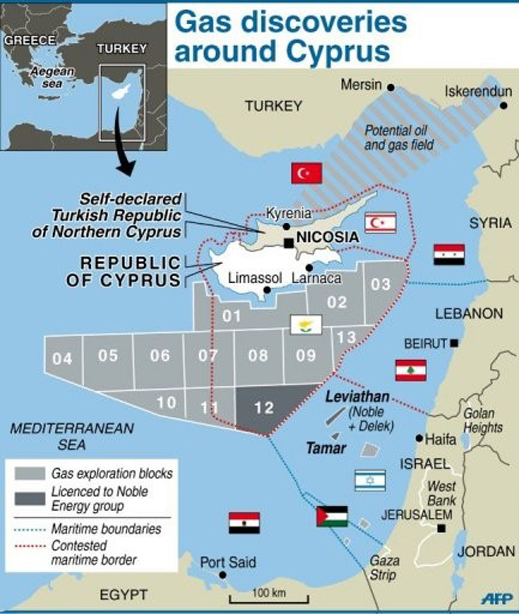
Source: http://defense-arab.com
Papadopoulos titles himself a senior consultant at the Hudson Institute in Washington. There is no sign of him there, according to Hudson.
Another Israeli presentation at Hudson last November explicitly warned of the “strategic implications of increased Russian presence and Turkish activism in the Mediterranean, growing terrorist movements in the Middle East, burgeoning regional conflict over energy, and the emergence of a Cypriot-Greek-Israeli security partnership.”
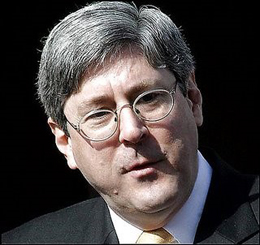 Hudson’s head of security studies, an Israel lobbyist in Washington named Douglas Feith (right), is promoting his version of an Israel-Cyprus alliance to defend against Russian and Turkish gas attacks every year.
Hudson’s head of security studies, an Israel lobbyist in Washington named Douglas Feith (right), is promoting his version of an Israel-Cyprus alliance to defend against Russian and Turkish gas attacks every year.
In Putin’s remarks, following last week’s meeting with Anastasiades, he referred obliquely to the search for seabed gas in Cyprus’s offshore zone, and to Gazprom’s new gas supply pipeline for southern Europe through Turkey. “We know that foreign companies (American, European and Asian ones) are already working in Cyprus’ exclusive economic zone. Many of our partners I just named, including Cypriot leadership, are interested in cooperating more actively with Russian companies. We will consider these options and are not ruling out working more closely together. We expressed interest in this before, but as far as I know, we did not win the tenders that were declared earlier. Now we see that our partners in Cyprus are still showing interest. I repeat, today we stated that we are ready to broaden this cooperation.”
For more on Gazprom’s plan for the “Turkish Stream” pipeline, read this.
An influential Cyprus businessman comments: “On the economic front, Cyprus offshore business [with Russia] will be effectively shut down in the next year. That’s a huge blow for Cyprus. The gas situation for Cyprus is dismal. The Eni wells have come up dry, as have the Total wells. Only one well has turned out positively, but it has half the reserves initially estimated. Cyprus may, after all, never be an energy power of much worth, while Turkey already is – without investing a dime. Putin can now assuage Cypriots by making nice noises. But in reality he will do nothing more than perhaps ask Gazprom to again explore the possibility of participation in the third [offshore tender] round. The difficulty for Gazprom is that except for Sakhalin, where Shell took the lead, it is not an offshore drilling company. Also, since the start of sanctions, no one from the US or Europe will make a JV with it.”
Russian military analysts acknowledge that as Russian naval operations in the Mediterranean extend their geographical reach, there is a requirement for longer-range aerial surveillance of the AWACS type. Gennady Nechaev, a military analyst at Vzglyad in Moscow, said he is aware of speculation that Russia wants a forward base from which to operate aircraft for gathering electronic intelligence. The need is particularly acute because the Russian surface fleet cannot support long-range surveillance aircraft.
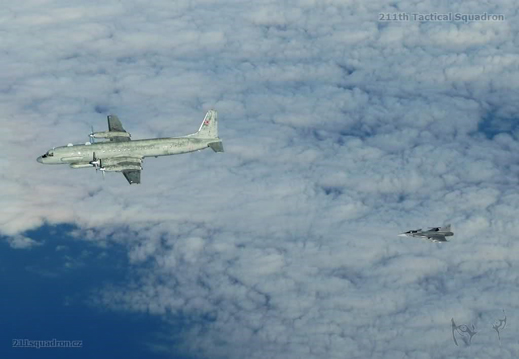 Nechaev says the Il-20 Coot is a candidate (above), the Il-38 anti-submarine hunter, or one of their more advanced successors, the Tu-214R or the A-50M (below). Western military handbooks claim the A-50M’s maximum flight range is 5,000km; at range of 2,000km, the A-50 can remain on patrol for less than an hour and a half. Operating from the southernmost Russian bases, that’s neither as far, nor as long, as the Russian Navy requires. “For Russia the possibility of temporary accommodation [on Cyprus] would be very advantageous”, Nechaev notes.
Nechaev says the Il-20 Coot is a candidate (above), the Il-38 anti-submarine hunter, or one of their more advanced successors, the Tu-214R or the A-50M (below). Western military handbooks claim the A-50M’s maximum flight range is 5,000km; at range of 2,000km, the A-50 can remain on patrol for less than an hour and a half. Operating from the southernmost Russian bases, that’s neither as far, nor as long, as the Russian Navy requires. “For Russia the possibility of temporary accommodation [on Cyprus] would be very advantageous”, Nechaev notes.
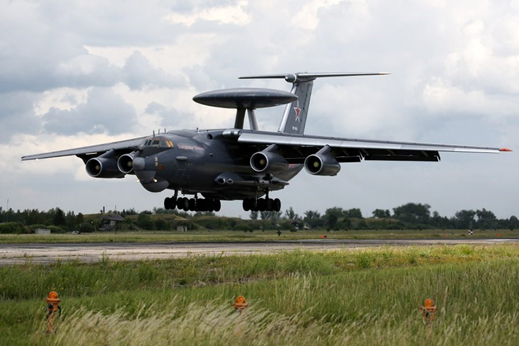 Russian Air Force A-50M, June 2014.The first A-100 is scheduled to fly in 2016.
Russian Air Force A-50M, June 2014.The first A-100 is scheduled to fly in 2016.
Starting next year, it is planned to replace the A-50 with the A-100. What range and patrol time the new AWACS will have isn’t publicly known. Russian military analysts say that neither the A-50 nor the A-100 is likely to be based in Syria; signals intelligence there is gathered from satellite and other sources at ground stations, at least one of which has been overrun by Syrian rebels. Paphos may be available for Russian refueling operations, but not for basing, according to both Russian and Cypriot sources.
“I do not read much significance in the defence deals,” a Cyprus source said Saturday, “and I think the reports are exaggerated, especially given that Cyprus wants to be in NATO. All in all, Cypriots have done well to keep some accord with Russians while casting their lot fully into American hands. Anastassiades was more hawkish in his anti-Russia agenda until Europe bankrupted him two weeks into his presidency. He has not found any love in Europe. He is however getting disillusioned that the Americans are not able to deliver Turkish compliance. His detractors are rallying the population that Cyprus has abandoned Russia, and this means end of everything for them- no more Russian beauties to be seduced on beaches, no more Russian tourists paying for crappy service, and worse, no more Russian oligarchs and gangsters with unlimited cash to squander. With all the information about Russian bank accounts now available to Americans, and Cyprus firmly a part of EU sanctions there is no reason for Putin to do any more than the minimum. I am sure he gave an earful to Nicos privately going by how combative Putin was in his press conference.”
“I do believe Russians see Cyprus as worthy of more trust than Greeks. The only bases in Cyprus are the British and they are proper bases. Americans and Brits will ruin Cyprus if it gave a permanent ‘base’ to Russians – I do not think it’s even on the agenda. Nicos will face a lot of criticism from within his own party. His closest advisors are rabid anti-Russia ideologues. I do not see him as doing anything against Americans and Brits except some very transparent but juvenile attempt to play them off against each other.”


John Helmer?? As in, long-time suspected KGB agent John Helmer?
http://www.sfgate.com/books/article/Another-Ex-KGB-Spy-Spills-the-Beans-Yuri-B-3041643.php
http://20committee.com/2015/02/23/when-kremlin-trolls-attack/
And I actually worked for Goldman, as opposed to being rumored to have worked for Goldman. So? That’s an ad hominem attack, which is a violation of our comments policy.
The review itself says the charge is dubious:
And herein lies the central problem with all the recent KGB memoirs: There is virtually no way to substantiate the claims their authors make. And there is every reason to believe that the lure of potential best-sellerdom may very well cause these former experts at disinformation to indulge in romantic exaggeration… the spy stories that Shvets relates should be taken with a grain of salt and a shot of pepper vodka.
As Mark Ames wrote:
I personally like John and am friends with him after all these years; I’ve done Skype interviews with his Australian j-school classes a few times now, and we used to publish him once in awhile (and savage him as well) in The eXile. But you should know about his alleged past in case it becomes an issue. My standard answer would be to tell anyone to fuck off and stick to John’s facts or lack thereof.
Pointing out that John Helmer is suspected by people such as John R. Schindler to be an ex-KGB operative is NOT a pure ad hominem attack when you are promoting Helmer as an authority on Russian affairs. Especially when you promote him as “the only western journalist to direct his own bureau independent of single national or commercial ties.” True or not, the claim bears directly on your claim that he is “independent.”
You act as if a questioned allegation about his history is accurate. And do not present a single objection to the content of the post. That IS an ad hominem attack. You are accumulating troll points by persisting.
Well apparently you’ll soon be joined on the “Group – W” bench by U.S. ambassador to Cyprus John Koenig who is allegedly being recalled after a series of Twitter remarks.
As a proud supporter and member of the Deep State, and perforce a lying sack of shite, Schindler would say that stuff anyway because his favored social order depends on it.
Very interesting. At first glance, 2 things: it appears Russia is taking advantage of Cyprus’s economic shambles and resentment to position Russian military equipment primarily to protect Turkey, and this move explains why David Cameron went so ballistic and sent in British forces to hold a presence in Ukraine – until the war there can be concocted. Obama also just sent in some troops to “train” Ukranians, which is disconcerting. More than he did in Libya where he left it to British special forces which were hastily landed (in the wrong place) and then klutzed around while French bombers leveled the country. Maybe the French said No this time. War is very expensive and the EU can’t get much more blood out of the stone.
Plus this is such a chess game. If Russia can keep pipelines from crossing Syria for the EU, and liquified natgas from Israeli refineries from going also to the EU, then the amount of oil available for NATO will be drastically reduced and we just learned yesterday that the US really isn’t producing enough oil to replace more than half of its imports. Then all Russia has to do is maintain support for Iran, and focus their land forces around the Black Sea/Caspian to keep the weasels away from their southern oil.
STO,
WRT the observations in your final sentence, read this last week: http://www.atimes.com/atimes/Middle_East/MID-01-260215.html
The overall situation appears to be increasingly fluid.
I am also reminded in all this of General Tommy Franks’ quote about Feith while the latter was at the DoD in the runup to the Iraq War, second para from bottom of first page of this article: http://www.slate.com/articles/news_and_politics/assessment/2004/05/douglas_feith.html
Anybody remember Wolfowitz? He’s back!?!? Jeb Bush picks Wolfowitz as his foreign policy advisor. No amount of failure gets rid of these neocons.
http://www.bloomberg.com/politics/articles/2015-02-22/wolfowitz-jeb-bush-foreign-policy-adviser-plays-up-reagan-influence
Since neocon foreign policy appears universally bipartisan, I would think the ranks would be flush with up and comer young neocons.
Then again, maybe Jeb wants the experienced neocon gravitas that only a founding father like Wolfowitz can bring to the campaign, Perhaps some sort of apostolic succession or laying on of hands like Cheney–>Nuland–>Obama would also work for Jeb.
Hi Susan, enjoy your regular posts and now have an opportunity to contact direct.
The RAF are doing AWACS patrols to collect all transmissions from Levant for analysis. Its been going on for years. UK will vociferously object to any Russian presence nearby as the provision of digital data to the US is an aspect of British importance to USA which UK desperately wishes to maintain and if possible enhance. Its a cold world out there to be alone.
Paphos field image appears dead: http://www.nakedcapitalism.com/wp-content/uploads/2015/03/Paphos-field.jpg
Those benevolent brits, caught in the middle again.
http://en.wikipedia.org/wiki/Ayios_Nikolaos_Station
Major, fixed, land based surveillance station for the Middle east, Is it part of the DMZ or not? Seems very MZ, to me.
The station is one of the largest in the world, and completely surrounded by the turkish part of cyrpus.
Five eyes/ECHELON
http://en.wikipedia.org/wiki/ECHELON
http://en.wikipedia.org/wiki/Five_Eyes